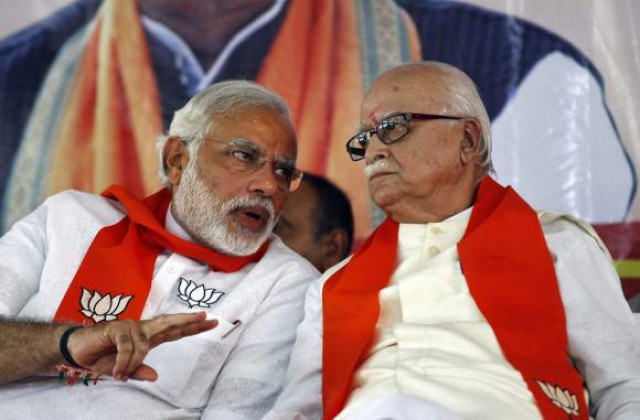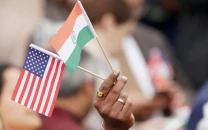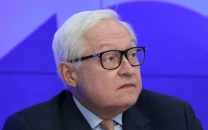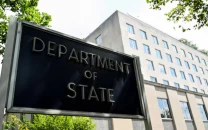BJP puts 'no first use' nuclear policy in doubt
Modi aides say that if he becomes prime minister, India would get tougher in territorial disputes with China.

BJP leader Lal Krishna Advani (R), listens to BJP prime ministerial candidate Narendra Modi during a workers' party meeting ahead of the general election, at Gandhinagar in Gujarat on April 5, 2014. PHOTO: REUTERS
Unveiling its election manifesto, the party gave no details, but sources involved in drafting the document said the "no-first-use" policy introduced after India conducted a series of nuclear tests in 1998 would be reconsidered.
Pakistan does not profess "no first use".
The BJP, which was in power at the time of India's underground blasts, appears to be on the cusp of returning to government under the leadership of Narendra Modi, a Hindu nationalist many expect would adopt a muscular foreign policy.
The BJP made no mention of reviewing nuclear policy in its manifesto for the previous elections in 2009.
Opinion polls have consistently shown that the BJP will emerge as the biggest party in the five-week election that began on Monday. They suggest that, while the party is likely to fall short of the parliamentary majority needed to rule on its own, it would have the best chance to form a coalition government.
Two aides to Modi told Reuters in the run-up to the vote that if he becomes prime minister, India would get tougher in territorial disputes with China and more robust with Pakistan over attacks by militants based there.
In its manifesto, the party said it would seek friendly relations with neighbours, but – without naming any country – vowed to "deal with cross-border terrorism with a firm hand" and take a "strong stand and steps" when required.
India adopted a no-first-use policy at a time when it was under pressure from punitive embargoes by Western nations for its nuclear tests, but since then it has been unofficially accepted as a nuclear power.
The United States struck a deal with New Delhi in 2008 to give it access to civilian nuclear technology as well as finance even while it carried on with its weapon program.
The no-first-use policy was based on a premise that India would retaliate so massively against a nuclear strike that an enemy would not contemplate such a move in the first place.
However, a source who advises the BJP said there has been significant debate in recent years about being bound to the policy given the advances of Pakistan's nuclear capability.
He said Pakistan's nuclear inventory may have already overtaken that of its neighbour, and it has claimed progress in miniaturization of weapons for use on the battlefield.
"Do we need tactical weapons? This issue was never raised and discussed because at the time it was not a concern," said another source involved in drawing up the manifesto.
‘MAD’ doctrine
Murli Manohar Joshi, head of a committee that framed the BJP's nuclear policy, declined to spell out whether no-first-use could be discarded. "Read the manifesto," he told Reuters. "It has to be in sync with geostrategic conditions."
There was no immediate reaction from the Pakistan government or its military.
A former Pakistani national security adviser, retired Major-General Mahmud Ali Durrani, said he would not be concerned if India revised the central tenet of its nuclear doctrine.
"I don't think it will be of great consequence," he said. "The nuclear doctrine here is MAD (mutually assured destruction). If one side does it, the other side has enough to cause unacceptable damage in response."
Durrani said there was more concern in Pakistan about the "overall attitude" of Modi, who was chief minister of the western Indian state of Gujarat in 2002 when more than 1,000 people, mostly Muslims, were slaughtered in mob violence.
Modi has always vehemently denied that he allowed, or even encouraged, the bloodshed, driven by a Hindu nationalist agenda, and a Supreme Court inquiry found no evidence to prosecute him.
The BJP manifesto set out its Hindu nationalist leanings, with a vow to explore building a temple at the site of a mosque in northern India that was torn down by zealots 22 years ago, potentially putting a deeply controversial issue back into play.
"There's a religious right in the BJP so they want to acknowledge that without making it the centrepiece of the manifesto," said Ashok Malik, a political columnist. "I don't think the BJP is going to take it forward as a political movement."
The party also made a commitment to withdrawing a special autonomous status accorded to Jammu and Kashmir state, which many believe prolongs ambiguity over the status of a territory claimed by Pakistan.



















COMMENTS
Comments are moderated and generally will be posted if they are on-topic and not abusive.
For more information, please see our Comments FAQ